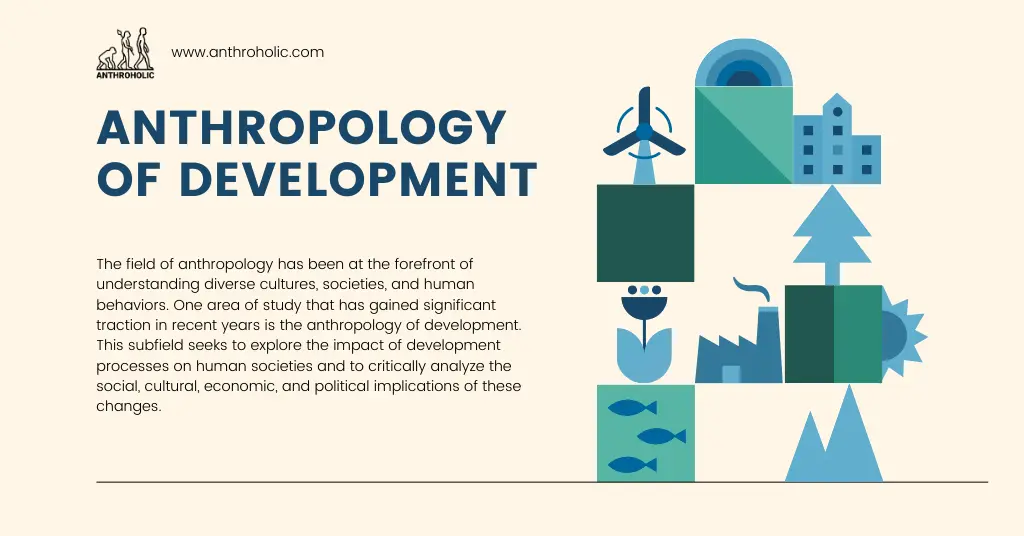AI Answer Evaluation Platform Live Now. Try Free Answer Evaluation Now
Anthropology of Development
The field of anthropology has been at the forefront of understanding diverse cultures, societies, and human behaviors. One area of study that has gained significant traction in recent years is the anthropology of development. This subfield seeks to explore the impact of development processes on human societies and to critically analyze the social, cultural, economic, and political implications of these changes.

History of Anthropology of Development
The anthropology of development can trace its roots to the late 19th and early 20th centuries when anthropologists began to study non-Western societies undergoing rapid change due to colonial and imperial influences (Eriksen, 2010). During this time, anthropologists focused on understanding the cultural and social impacts of these changes on local communities. The post-World War II era saw a shift in the focus of anthropology towards development as a central concern. This period marked the beginning of major development initiatives undertaken by Western nations to rebuild war-torn countries and promote economic growth in underdeveloped regions. Anthropologists were increasingly employed by governments and international agencies to provide insights into local cultures and societies, assisting in the design and implementation of development projects (Gardner & Lewis, 2015).
The 1980s and 1990s witnessed a critical turn in anthropology, characterized by a growing dissatisfaction with the assumptions and practices of development. Anthropologists began to question the effectiveness of development interventions and the dominant development discourse. This critical perspective led to the emergence of new theoretical frameworks and the reevaluation of development practices (Edelman & Haugerud, 2005).
Theoretical Frameworks
- Modernization theory: Modernization theory emerged in the 1950s as a dominant framework for understanding development. It posited that societies followed a linear progression from traditional to modern, with Western societies serving as the model for development. This theory emphasized economic growth, technological advancement, and social and political change as crucial components of development (Rostow, 1960).
- Dependency theory: In response to the shortcomings of modernization theory, dependency theory emerged in the 1960s and 1970s. This framework emphasized the role of historical and structural factors in shaping development trajectories. Dependency theorists argued that underdeveloped countries were trapped in a cycle of dependency on developed countries, which exploited their resources and hindered their growth (Frank, 1966).
- World-systems theory: World-systems theory, developed by Immanuel Wallerstein (1974), expanded on dependency theory by conceptualizing the global economy as a single, interconnected system. This theory divided the world into core, semi-peripheral, and peripheral regions, each with distinct economic and political characteristics. World-systems theory highlighted the unequalrelationships between these regions, with core countries exploiting peripheral countries for their resources and labor. This exploitation leads to an unequal distribution of wealth and power within the global system, perpetuating underdevelopment in peripheral regions.
- Post-development theory: Post-development theory emerged in the 1990s as a critique of the dominant development discourse and its underlying assumptions. Post-development theorists argue that development is a culturally biased, Western-centric concept that imposes a specific set of values and practices on non-Western societies. These theorists call for alternative, more culturally sensitive approaches to development, recognizing the diversity of human experiences and aspirations (Escobar, 1995).
Key Concepts in Anthropology of Development
- Development as a cultural process: Anthropologists view development as a cultural process, where societies undergo change as they engage with and adapt to new ideas, technologies, and practices. This perspective emphasizes the importance of understanding local cultures and contexts when designing and implementing development interventions (Gardner & Lewis, 2015).
- The role of power and hegemony: Power and hegemony play a central role in shaping development processes and outcomes. Anthropologists examine how power dynamics, including those related to class, gender, and ethnicity, influence development policies and projects. They also explore the ways in which dominant development discourses and practices can serve as tools of control and oppression (Ferguson, 1990).
- Ethnographic approaches: Ethnography is a key methodological approach in anthropology, involving immersive, long-term fieldwork to gain in-depth understandings of local cultures and societies. In the anthropology of development, ethnographic research provides valuable insights into the lived experiences of individuals and communities affected by development projects, highlighting the complexity and diversity of development processes (Mosse, 2005).
- Gender and development: Gender is a crucial factor in development processes, as it shapes access to resources, opportunities, and power dynamics within societies. Anthropologists investigate the gendered impacts of development policies and projects, advocating for more inclusive and equitable approaches that address gender inequalities and promote the empowerment of women and other marginalized groups (Kabeer, 1994).
Case Studies and Empirical Data
- Microfinance in Bangladesh:The Grameen Bank, founded by Nobel laureate Muhammad Yunus, has been a significant development initiative in Bangladesh. It provides microloans to the poor, predominantly women, to start their own businesses. However, anthropological research by scholars like Aminur Rahman and Lamia Karim has shown that this model also creates new forms of debt bondage, reinforces gender inequality, and often fails to lift borrowers out of poverty. These studies, based on in-depth fieldwork, highlight the complex social realities that often get overlooked in development narratives.
- Fair Trade Coffee in Guatemala:Fair Trade initiatives aim to provide better trading conditions and promote sustainability. Gavin Fridell’s work on Fair Trade coffee farmers in Guatemala has shown that while the Fair Trade label provides some benefits, it does not significantly reduce poverty or inequality. Rather, it often reinforces the status quo by making “ethical consumption” the responsibility of consumers in the Global North, rather than addressing the systemic issues that lead to inequality in the first place.
- Dams and Displacement in India:The Narmada Dam project in India, which aimed at providing water for irrigation and hydroelectric power, led to large-scale displacement of indigenous communities. Anthropologists like Amita Baviskar have documented the social and environmental consequences of such development projects, as well as the resistance movements they spawn. This research underlines the importance of considering local knowledge and rights in development planning.
- Neoliberal Reforms in Tanzania:James Ferguson’s work in Lesotho and Tanzania provides a critique of neoliberal development policies. He argues that these policies often fail to account for local economic systems and can exacerbate inequality. His work emphasizes the importance of anthropological perspectives in understanding how international policies play out at the local level.
- Healthcare Development in Haiti:Paul Farmer’s work in Haiti is another significant case study. His organization, Partners in Health, has combined medical treatment with social and economic development initiatives, demonstrating the interconnectedness of health and poverty. His anthropological perspective has been instrumental in understanding and addressing the social determinants of health.
Conclusion
In conclusion, the anthropology of development has evolved significantly over the past century, adapting to shifts in global development discourse and practice. By examining the interplay of cultural, social, economic, and political factors in shaping development processes and outcomes, anthropologists have made substantial contributions to our understanding of development. This has led to a more nuanced and context-specific approach to development practice, one that is better equipped to address the complex challenges faced by societies in the 21st century.
As the world continues to grapple with pressing issues such as climate change, rising inequality, and persistent poverty, the anthropology of development will remain an essential field of study. Anthropologists will continue to play a critical role in informing development policy and practice, ensuring that development interventions are grounded in a deep understanding of local cultures and contexts and are tailored to the needs and aspirations of the communities they seek to serve. By drawing on the insights and methods of anthropology, we can work towards a more just, equitable, and sustainable future for all.
See Also
References
- Edelman, M., & Haugerud, A. (Eds.). (2005). The anthropology of development and globalization: From classical political economy to contemporary neoliberalism. Wiley-Blackwell.
- Eriksen, T. H. (2010). Small places, large issues: An introduction to social and cultural anthropology. Pluto Press.
- Escobar, A. (1995). Encountering development: The making and unmaking of the Third World. Princeton University Press.
- Ferguson, J. (1990). The anti-politics machine: “Development,” depoliticization, and bureaucratic power in Lesotho. Cambridge University Press.
- Frank, A. G. (1966). The development of underdevelopment. Monthly Review Press.
- Gardner, K., & Lewis, D. (2015). Anthropology and development: Challenges for the twenty-first century. Pluto Press.
- Kabeer, N. (1994). Reversed realities: Gender hierarchies in development thought. Verso.
- Mosse, D. (2005). Cultivating development: An ethnography of aid policy and practice. Pluto Press.
- Rostow, W. W. (1960). The stages of economic growth: A non-communist manifesto. Cambridge University Press.
- Wallerstein, I. (1974). The modern world-system I: Capitalist agriculture and the origins of the European world-economy in the sixteenth century. Academic Press.



